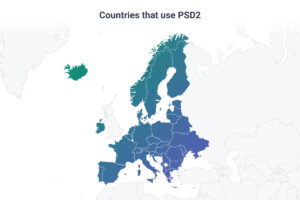
As migration increases and globalisation continues at pace, financial institutions around the world are having to review and verify a greater range of identification (ID) documents when onboarding customers than they traditionally would. This is backed up by research from the United Nations (UN) highlighting that nearly four per cent of the world’s population were migrants in 2020 - three times more than in 1970.
“Digital nomads” are among the fastest-growing migrant segments taking advantage of remote work policies and improving high-speed internet access to toil away while travelling the world. Their number has grown 220 per cent in the last three years to 35 million. This has led to financial institutions around the world reviewing a growing number of unfamiliar ID documentation formats as part of their remote onboarding and manual ID verification processes.
At the same time, fraud remains stubbornly high with payments and transactions commonly taking place online. According to UK Finance, there were 1.4 million fraud cases occurring in the UK in the first half of 2023.
Source an eIDV platform
Embracing an electronic identity verification (eIDV) platform is the best way to undertake ID verification in a world experiencing these levels of migration growth and fraud. These can be accessed via any delivery mechanism—cloud, API (application programming interface) and SaaS (software as a service)—and scaled up or down according to the users' needs.
Because these tools are “always on” they can, in real-time, cross-check the names, addresses, email addresses and phone numbers provided by prospective customers during remote onboarding—providing a good customer experience while preventing fraud. For the best outcome, it’s recommended to source an eIDV platform with access to billions of consumer and business records from reputable sources around the world, such as government, utility and credit agencies. These can deliver efficient customer onboarding as part of an effective ID verification service, anywhere in the world.
Using such a tool is considerably quicker, more accurate and cost effective for undertaking ID verification and preventing fraud, when compared to manual checks. This technology requires no additional staffing or training costs, and there’s no risk of human error.
First step: Clean data
Prior to sourcing an eIDV platform, it’s sensible to make sure that you have clean and up-to-date customer data. Taking this first step—for example, matching a name to the right address—provides confidence in the accuracy of your data and that your customers are who they say they are. Putting processes in place that deliver ongoing data hygiene, such as an address lookup and autocomplete service, and gathering accurate address data in real-time at the onboarding stage is vital. By delivering address validation, these tools support ID verification. Additionally, such data quality and cleaning services that pick up any inaccuracies in customer contact data are more cost effective than using eIDV to undertake the same role.
Full service ID verification
The ID verification platform should offer global data on know your business (KYB), sanctions, politically exposed persons (PEPs) and relatives and close associates (RCAs), along with adverse media screening. Such a tool provides a full service ID verification approach, along with economies of scale.
KYB checks are vital
KYB screening is critical to fully understand the risks posed by new and existing business customers and suppliers, and therefore helps to prevent fraud from occurring. It’s important because fraud is often committed by shell companies or organisational structures that aren’t real. Also, KYB checks hinder financial crimes, such as money laundering and terror financing, which can cause substantial reputational damage.
Integrated sanctions data
Having access to an up-to-date sanctions list is key to ensure that you are up to speed with the latest sanctions data and regulations. Despite the legal requirement to screen for sanctions, it’s surprising how many of those in financial services don’t have access to such a list, or at least an up-to-date one.
The list should be accessed as part of an automated eIDV platform that collects and synthesises sanctions data from a wide range of trusted sources worldwide. It also needs to continually scan for updates on sanctions data and deliver them daily, in real-time. This automated approach is a much more efficient and accurate way to implement sanctions screening.
Think PEPs and RCAs
For a wider best practice approach to sanctions screening—to protect your organisation against potential fraud and avoid having customers that can damage your reputation—it’s vital to obtain PEP and RCA data from around the world. Those in both groups are more likely to be involved with or drawn into crime because of the nature of their roles or relationships with those in positions of authority. Knowledge of who these people are is important, because if they abuse their positions to defraud your organisation, not only will there be monetary costs, but the situation could cause significant reputational damage. In the UK, financial organisations are legally obliged to undertake enhanced checks of both domestic and foreign PEPs.
Automated adverse media screening
Undertaking adverse media checks is a vital part of best practice customer due diligence (CDD) and anti-money-laundering (AML) processes. The automated technology that powers it enables those in financial services to keep up to date on the latest worldwide news and alerts in real-time on any arrests, court cases or convictions against users of their services. These may be PEPs and RCAs, along with others who could have possible negative regulatory, financial or reputational consequences to their organisations.
Scanning for negative news on an individual or business, even if they do not appear on any international watchlists, is essential to obtaining the most accurate risk profiles of those using your services. Doing so also supports best practice due diligence for know your customer (KYC), KYB for possible suppliers and partners, and AML.
In summary
With the number of migrants growing rapidly in a more globalised world, undertaking seamless, real-time ID checks via a full service eIDV platform with a global reach is vital to prevent fraud and provide a good customer experience. The other alternative—undertaking costly manual checks using fragmented datasets from a variety of different sources lacking worldwide coverage—is no longer fit for purpose to stop the scourge of fraud.
- SEO Powered Content & PR Distribution. Get Amplified Today.
- PlatoData.Network Vertical Generative Ai. Empower Yourself. Access Here.
- PlatoAiStream. Web3 Intelligence. Knowledge Amplified. Access Here.
- PlatoESG. Carbon, CleanTech, Energy, Environment, Solar, Waste Management. Access Here.
- PlatoHealth. Biotech and Clinical Trials Intelligence. Access Here.
- Source: https://www.finextra.com/blogposting/25639/preventing-fraud-in-a-globalised-world?utm_medium=rssfinextra&utm_source=finextrablogs
- :has
- :is
- :not
- $UP
- 1
- 2020
- 2023
- 220
- 35%
- 4
- a
- abuse
- access
- accessed
- According
- accuracy
- accurate
- Additional
- Additionally
- address
- addresses
- ADvantage
- adverse
- adverse media
- against
- agencies
- alerts
- along
- also
- AML
- among
- an
- and
- any
- anywhere
- api
- appear
- Application
- approach
- ARE
- around
- arrests
- AS
- associates
- At
- authority
- autocomplete
- Automated
- avoid
- away
- backed
- BE
- because
- BEST
- billions
- both
- business
- business customers
- but
- by
- CAN
- cases
- Cause
- cent
- Checks
- clean
- Cleaning
- Close
- collects
- committed
- commonly
- Companies
- compared
- confidence
- Consequences
- consumer
- contact
- continually
- continues
- Cost
- costly
- Costs
- could
- Court
- court cases
- credit
- Crime
- Crimes
- critical
- customer
- customer data
- customer experience
- Customers
- daily
- damage
- data
- data quality
- datasets
- Date
- deliver
- delivering
- delivery
- Despite
- different
- diligence
- do
- documentation
- documents
- doing
- Domestic
- Dont
- down
- drawn
- due
- during
- economies
- Economies of Scale
- Effective
- efficient
- Electronic
- enables
- enhanced
- ensure
- error
- essential
- Even
- example
- existing
- experience
- experiencing
- exposed
- finance
- financial
- financial crimes
- Financial institutions
- financial services
- financing
- Finextra
- First
- fit
- For
- foreign
- four
- fragmented
- fraud
- from
- full
- fully
- gathering
- Global
- good
- Government
- greater
- Group’s
- Growing
- grown
- Growth
- Half
- Have
- having
- helps
- High
- highlighting
- hinder
- How
- HTTPS
- human
- ID
- Identification
- Identity
- Identity Verification
- if
- implement
- important
- improving
- in
- Increases
- individual
- institutions
- Interface
- International
- Internet
- internet access
- into
- involved
- IT
- jpg
- Keep
- Key
- Know
- Know Your Customer
- knowledge
- kyb
- KYC
- lacking
- Last
- latest
- Laundering
- least
- Led
- Legal
- legally
- levels
- likely
- List
- longer
- make
- manual
- many
- matching
- May..
- Media
- migrant
- migration
- million
- Monetary
- money
- Money Laundering
- more
- more efficient
- most
- much
- name
- names
- Nations
- Nature
- needs
- negative
- New
- news
- no
- number
- numbers
- obliged
- obtain
- obtaining
- occurring
- of
- offer
- often
- on
- Onboarding
- ONE
- ongoing
- online
- only
- or
- organisation
- Organisations
- Other
- Others
- Outcome
- Pace
- part
- partners
- payments
- People
- per
- persons
- phone
- pick
- Place
- platform
- plato
- Plato Data Intelligence
- PlatoData
- policies
- politically
- population
- posed
- positions
- possible
- potential
- powers
- practice
- prevent
- preventing
- processes
- Profiles
- Programming
- prospective
- protect
- provide
- provided
- provides
- purpose
- Putting
- quality
- quicker
- range
- rapidly
- reach
- real
- real-time
- recommended
- records
- regulations
- regulatory
- Relationships
- relatives
- remains
- remote
- remote work
- reputable
- requirement
- requires
- research
- review
- reviewing
- right
- Risk
- risks
- Role
- roles
- SaaS
- same
- Sanctions
- say
- Scale
- scaled
- scan
- Screen
- screening
- seamless
- segments
- service
- Services
- Shell
- should
- significant
- situation
- So
- Software
- software as a service
- Source
- Sources
- Sourcing
- speed
- staffing
- Stage
- Step
- Stop
- structures
- substantial
- such
- suppliers
- support
- Supports
- sure
- surprising
- taking
- Technology
- than
- that
- The
- the UK
- the world
- their
- Them
- There.
- therefore
- These
- they
- this
- those
- three
- time
- times
- to
- tool
- tools
- traditionally
- Training
- Transactions
- trusted
- Uk
- UN
- understand
- undertake
- unfamiliar
- United
- united nations
- up-to-date
- Updates
- users
- using
- utility
- validation
- variety
- Verification
- verify
- via
- vital
- Way..
- were
- when
- which
- while
- WHO
- wide
- Wide range
- wider
- will
- with
- Work
- world
- world’s
- worldwide
- would
- years
- you
- Your
- zephyrnet











